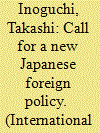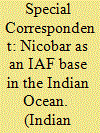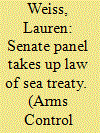| Srl | Item |
| 1 |
ID:
133292


|
|
|
|
|
| Publication |
2014.
|
| Summary/Abstract |
Japanese foreign policy is at a crossroads. A global power transition is under way; while the United States remains the leading global power, across the globe non-western developing states are on the rise. Within Asia, China is a growing presence, wielding expansive claims on islands and maritime rights, and embarking on a defence buildup. As power shifts across Asia and the wider world, the terms of leadership and global governance have become more uncertain. Japan now finds itself asking basic questions about its own identity and strategic goals as a Great Power. Within this changing context, there are three foreign policy approaches available to Japan: (1) a classical realist line of working closely with the US in meeting China's rise and optimizing deep US engagement with China by pursuing a diplomacy focused on counterbalancing and hedging; (2) a transformative pragmatist line of rejuvenating itself through Abenomics and repositioning itself in East Asia; and (3) a liberal international line of pursuing a common agenda of enhancing global liberal-oriented norms and rules through multilateral institutions along with the United States and the Asia-Pacific countries. Current Japanese foreign policy contains a mix of all three approaches. The article argues that a greater focus on the second and the third lines would enhance the current approach; it would ensure that Japan is more in harmony with the global environment and help it work positively for global and regional stability and prosperity, thus enabling Japan to pursue an 'honorable place in the world' (as stated in the preamble to its constitution).
|
|
|
|
|
|
|
|
|
|
|
|
|
|
|
|
| 2 |
ID:
117149


|
|
|
|
|
| Publication |
2012.
|
| Summary/Abstract |
In broad pursuance of the goals of China's national defence in the new era, the People's Liberation Army Navy has been mainly tasked with the defence of its maritime rights, interests and security, safeguarding its economic development and serving its peaceful diplomacy. The Chinese submarines figure prominently in their military strategy of "Active Defence." The blistering pace of submarine modernisation, supporting infrastructure and intensive training regimen bear testimony to their centrality in the Chinese 'Offshore Defence' maritime thought process. With their nuclear attack submarines particularly capable of far-ranging missions of long durations, the United States as the predominantly present maritime power in the western and central Pacific Ocean will invariably stand to be affected. A real possibility of their deployment into the Indian Ocean in the medium to long term will also impact on the Indian maritime security scenario. Hence, it is prudent to carefully assess the Chinese nuclear submarine program.
|
|
|
|
|
|
|
|
|
|
|
|
|
|
|
|
| 3 |
ID:
150841


|
|
|
| 4 |
ID:
115739


|
|
|
| 5 |
ID:
107583


|
|
|
| 6 |
ID:
185639


|
|
|
|
|
| Summary/Abstract |
The bicentennial of the Greek Revolution against Ottoman rule is an opportune time to ask why conflict between Greeks and Turks has continued for over two hundred years. Greek and Turkish national narratives reveal deeper reasons for the persistence of mutual belligerence, including common emphasis on national emancipation through violence, perceptions of iniquitous treatment in previous political settlements, and the influence of “banal imperialism” embedded in everyday national symbols. These mindsets continue to fuel disputes over Cyprus and maritime rights.
|
|
|
|
|
|
|
|
|
|
|
|
|
|
|
|